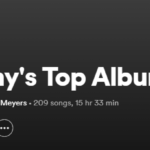 In this business, we all talk a lot about authenticity, transparency, engagement. I’ve seen a ton of blog posts, tweets, and whitepapers that say “corporations are no longer in control”. We focus on the new meaning of influence. This is all well and good, they’re conversations that need to be had, and they are admirable goals that can in fact map to business ROI.
In this business, we all talk a lot about authenticity, transparency, engagement. I’ve seen a ton of blog posts, tweets, and whitepapers that say “corporations are no longer in control”. We focus on the new meaning of influence. This is all well and good, they’re conversations that need to be had, and they are admirable goals that can in fact map to business ROI.
We still make assumptions, though. There are still some old habits we continue to believe to be true. One of the biggest things I’ve been noticing people falling back on when interacting, especially on behalf of a larger organization is speaking from a position of authority.
Authority is one of those nebulous positions that seems to have more to do with our own self-image than about any particular knowledge.
For me, the most appropriate definition for Authority in this context is the typically inaccurate assumption that a given person or organization’s content has inherent merit based on its source, rather than on its actual value to the community.
We all still fall into this trap sometimes. Our blogs are full of posts about the great things we (and the companies we work for) do, we create sweepstakes (read: bribes) built around using a particular product, we try to tell people what to think and what to do. At this point however, it’s not a safe bet to make any assumptions about the authority your voice carries within community. A few of the reasons what we say often doesn’t have the sway we think it does are:
- We have not built a trusted relationship within our community. You work for the company that makes the product? That’s great. So what? What have you done that would demonstrate to me that I should take what you say about your product seriously? As my friend Jason Falls says over at SocialMediaExplorer, “The trust you build is largely dependent upon the ability to convince them your intent is pure.” If you are the representative of a company, by definition your intent is to sell me on something, which tweaks the bullshit detectors in many of us.
- We as consumers trust users more than creators. Say you’re a member of a cooking community. Which person would influence your engagement more: The Communications Director for All-Clad, or Bobby Flay? The truth is, unless you’re in a tiny micro-niche industry, there are other more publicly visible experts on your product than you. This already puts you in second place for ‘entity with authority’.
- Assuming authority without earning the role of trusted advisor from the ground up makes us come off as obnoxious. Instead, (and here’s where the social media nerd comes out) start by listening, and then become a person-sized learning atom within the community.
All of this is hard for us to process. The loop of “We made it, of course we know best, don’t be silly.” is hard to break. For me, I’ve noticed that underneath stuff like that is fear. There is a fear and insecurity that “if we don’t talk about ourselves, nobody else will have a reason to either”
I’m here to say that I don’t think this is true anymore, and that not always having to be authoritative takes a lot of the tension and strain out of our day.It frees us to lean forward, engage, learn, connect.
Interestingly, that may also be how we build up true credibility in the conversation, as decided by others around us.
Related articles by Zemanta
- The one question you must ask when interacting (jeremymeyers.com)
- Lose It or Build It: Trust in Blogsphere and Beyond (onecoolsitebloggingtips.com)







[…] first, being curious about (and with) those around us, handling our fear, dealing with loneliness, de-emphasizing our egos, adjusting when conflict arises, focusing on context more than events, being compassionate, […]
[…] Some Thoughts on Authority: We don’t have it when we think we do. (jeremymeyers.com) […]
Awesome post, Jeremy.
I have witnessed “authority” and *authority* many times. It is amazing that *authority* can surprise people when they look for it. In the music industry space, I am shocked when smaller outfits get better penetration that major labels. Obviously, it's because they have a relationship of trust with their patrons. Now if those with *authority*, not “authority,” can learn how to properly use it to their advantage, we'll be getting somewhere!
Jeremy,
I think we place too much emphasis on the individuals and not ideas.
Whether they hold a position of authority or don't hold a position of authority makes little difference to me, personally. I'll hear them equally.
Sometimes the authority, whether I have a relationship with them or not, is right. And sometimes, the person I am buddies with is right.
I think it is far more dangerous to assume either of them is right at any given time. And the reason I think this is because once people build buddy networks, they start to leverage the number of their relationships as some sort of new measure for authority while “saying” that they are one of us. Kind of sad, really.
The cool thing about real relationships is that friends can agree to disagree and still be friends. Friends can be supportive, without requiring each other to prop them up. Friends don't expect responses to comments, posts, or whatever.
It always seems to me that you are one of those folks who is seeking something more pure. And I totally get that and admire it. Me too, in a different way. But I'm not certain the base majority is up for it.
Best,
Rich